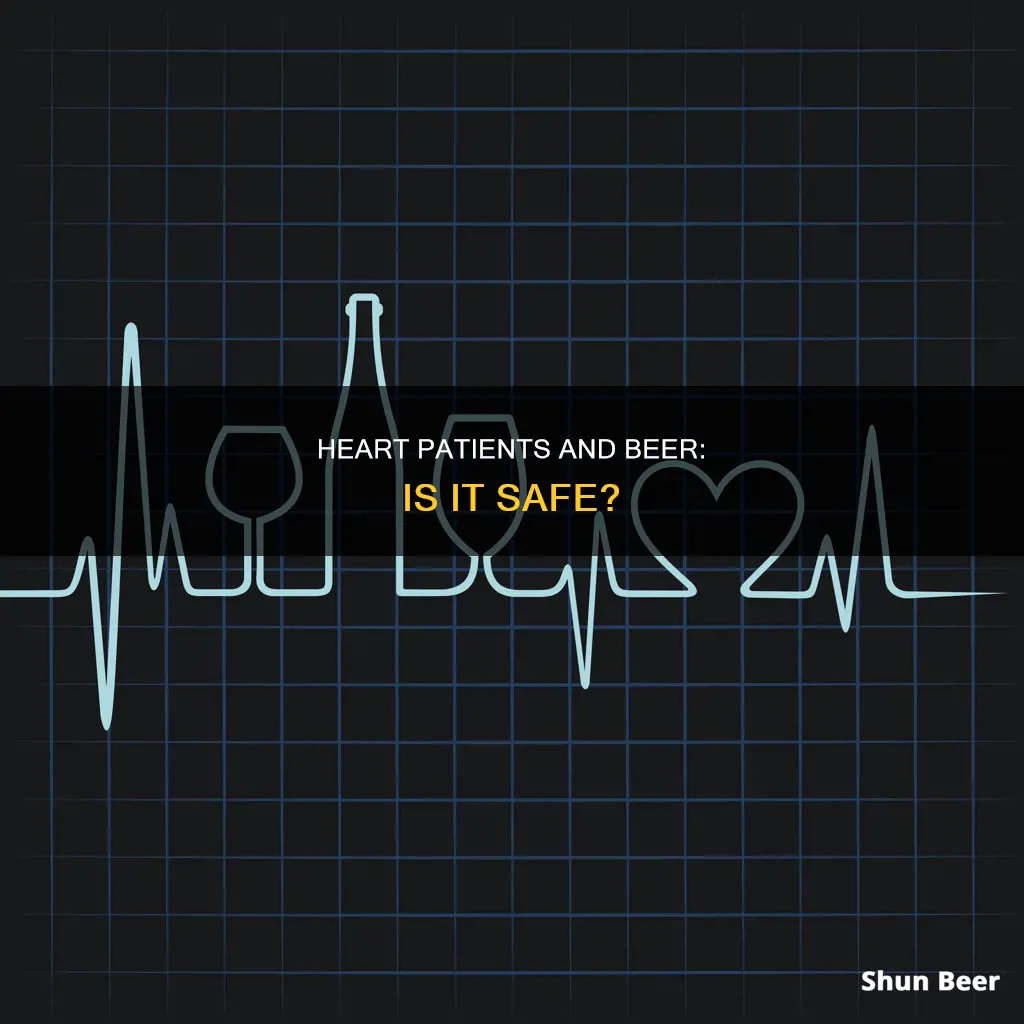
There are conflicting opinions on whether heart patients can drink beer. While some studies suggest that moderate drinking—defined as one drink per day for women and one or two for men—may lead to a lower risk of dying from heart disease, other studies indicate that any amount of alcohol consumption increases the risk of heart disease. Beer, like other types of alcohol, can impair the function of the endothelium, increase your heart rate, and is linked to increased blood pressure. Additionally, heavy drinking can lead to serious health problems such as liver disease, cancer, and peptic ulcers, and can contribute to obesity. For these reasons, it is generally recommended that people with heart conditions avoid alcohol or drink in moderation.
Can Heart Patients Drink Beer?
| Characteristics | Values |
|---|---|
| Recommended alcohol intake for women | 1 drink per day |
| Recommended alcohol intake for men | 1-2 drinks per day |
| What counts as 1 drink | 12 oz of beer, 4 oz of wine, or 1.5 oz of 80-proof spirits |
| Alcohol's effect on the heart | Raises HDL ("good") cholesterol, prevents blood from clotting, helps prevent damage caused by high LDL ("bad") cholesterol |
| Alcohol's negative effects | Obesity, high blood pressure, heart failure, stroke, heart disease, cardiomyopathy |
| Who shouldn't drink alcohol | People with irregular heart rhythm, a history of strokes, pregnant women, and anyone with a history of alcoholism |
What You'll Learn
- Heart patients should not consume more than the recommended limit of alcohol
- Alcohol can increase the risk of high blood pressure and heart disease
- Heavy drinking can lead to heart failure
- Alcohol-induced cardiomyopathy can be caused by binge drinking
- Alcohol may negatively impact the effectiveness of certain medications

Heart patients should not consume more than the recommended limit of alcohol
It is a common belief that alcohol, especially red wine, is good for the heart. However, this is not entirely accurate. While moderate drinking may have some benefits for the heart, excessive alcohol consumption can lead to serious heart-related problems. Therefore, it is crucial for heart patients to understand the risks associated with alcohol consumption and adhere to recommended limits.
Alcohol's Impact on Heart Health
Some studies suggest that moderate alcohol intake, defined as one drink per day for women and one to two drinks for men, may be linked to a lower risk of dying from heart disease. Additionally, moderate drinking can slightly raise levels of "good" HDL cholesterol and may help prevent blood clots, reducing the chances of heart attacks and strokes.
However, it is important to note that the positive effects of alcohol on heart health are not conclusive. Other factors, such as income, diet, and lifestyle choices, may also contribute to these observed benefits. Additionally, the positive effects of alcohol can also be obtained through exercise and a healthy diet.
Risks of Excessive Alcohol Consumption
Excessive alcohol intake is associated with an increased risk of heart conditions and other serious health problems. Heavy drinking can lead to high blood pressure, heart failure, stroke, and cardiomyopathy, a disorder that affects the heart muscle. Alcohol can also contribute to obesity and related health issues, as alcoholic beverages are often high in calories.
One specific condition caused by long-term heavy alcohol use is alcohol-induced cardiomyopathy, where the heart changes shape, leading to long-term damage and heart failure. This condition can affect anyone who consumes excessive amounts of alcohol and is not limited to those with alcohol use disorders.
Recommendations for Heart Patients
For heart patients, it is crucial to follow recommended alcohol limits. The Heart Foundation recommends avoiding alcohol altogether if you have a heart condition, as there is strong evidence that alcohol increases the risk of high blood pressure, which is a major risk factor for heart disease. Additionally, alcohol may change the way medications work, making them less effective.
If you are consuming alcohol, it is important to drink in moderation and not exceed the recommended limits. For women, it is recommended to limit alcohol intake to seven drinks per week, and for men, it is recommended to stay within 14 drinks per week. However, it is important to consult with your doctor to determine the safe limits for your specific condition and circumstances.
In conclusion, while moderate alcohol consumption may have some potential benefits for heart health, heart patients should not consume more than the recommended limit of alcohol. Excessive alcohol intake can lead to serious heart-related problems, and the risks far outweigh any potential benefits. It is always advisable to consult with a healthcare professional to determine the safest approach for your individual needs and circumstances.
Crafting Beer: My Career Choice and Passion
You may want to see also

Alcohol can increase the risk of high blood pressure and heart disease
While there is some evidence that moderate alcohol consumption may be linked to improved heart health, excessive alcohol intake can have serious negative impacts on cardiovascular health. Heavy drinking is associated with a range of adverse health outcomes, including high blood pressure, heart failure, and stroke.
High Blood Pressure
Excessive alcohol consumption is a significant risk factor for developing high blood pressure, or hypertension. Drinking too much alcohol can cause a rise in blood pressure, and individuals with hypertension are often advised by healthcare professionals to reduce their alcohol intake. This is particularly important for heart patients, as managing blood pressure is crucial for preventing further complications.
Heart Disease
Long-term heavy alcohol use can lead to alcohol-induced cardiomyopathy, a condition where the heart changes shape, causing long-term damage and leading to heart failure. This occurs when parts of the heart stretch and enlarge, weakening the heart muscle and reducing its ability to pump blood effectively. Alcohol-induced cardiomyopathy can affect anyone who consumes excessive amounts of alcohol and is more likely in those with alcohol use disorders or certain genetic mutations.
Weight Gain and Obesity
Alcohol is a source of excess calories and can contribute to weight gain and obesity, which can indirectly impact cardiovascular health. Obesity is associated with a range of health issues, including high blood pressure and heart disease. Additionally, the sugar content in mixed drinks and cocktails can further increase calorie intake, leading to weight gain over time.
Recommendations
It is important to note that moderate alcohol consumption, defined as one drink per day for women and one to two drinks per day for men, does not appear to be harmful to heart health for most individuals. However, heavy drinking and excessive alcohol intake are linked to negative cardiovascular outcomes. Therefore, it is crucial for individuals, especially those with heart conditions, to limit alcohol consumption to moderate levels or abstain entirely if advised by their healthcare professional.
Drinking Beer with Aligners: What You Need to Know
You may want to see also

Heavy drinking can lead to heart failure
Heavy drinking can have serious negative impacts on heart health and can lead to heart failure. Alcoholic cardiomyopathy (ACM) is a condition where the heart changes shape due to long-term heavy alcohol use. This change in shape causes long-term damage, leading to heart failure and other severe problems.
The condition causes parts of the heart to stretch and enlarge, which weakens the heart muscle and affects its ability to pump blood effectively. This reduction in blood flow means the body's available oxygen supply is lowered. ACM can also disrupt the heart's electrical system, causing the heart to beat out of sync. Additionally, alcohol can have a toxic effect on the heart, causing the formation of scar tissue, which can lead to irregular heart rhythms.
Heavy drinking can also indirectly worsen heart failure or its symptoms. It can raise blood pressure and heart rate, making the heart work harder. It can also contribute to obesity, as alcoholic drinks tend to be high in sugar and calories. This can add to the heart's workload and hinder physical activity, leading to further health complications.
Furthermore, heavy drinking can affect the liver's ability to produce proteins that help control blood clotting. This can interfere with certain medications commonly taken by people with heart failure, such as blood thinners.
While light or moderate drinking may not necessarily worsen heart failure, heavy drinking has been consistently linked to an increased risk of heart failure and other cardiovascular issues. Therefore, it is crucial for individuals, especially those with heart conditions, to drink in moderation or abstain from alcohol entirely to maintain heart health.
Beer and Typhoid: A Dangerous Mix?
You may want to see also

Alcohol-induced cardiomyopathy can be caused by binge drinking
Alcohol-induced cardiomyopathy is a condition that causes the heart to change shape due to long-term heavy alcohol use. This occurs when parts of the heart stretch and enlarge, weakening the heart muscle and reducing its ability to pump blood effectively. This condition can lead to severe problems, including heart failure.
Binge drinking is defined as consuming four or more drinks for women and five or more drinks for men on a single occasion. Frequent binge drinking can increase the risk of alcohol-induced cardiomyopathy. While this condition is relatively uncommon, occurring in about 1% to 2% of people who drink more than the recommended amount, it can have major impacts on an individual's life.
The toxic effects of alcohol can lead to oxidative stress, causing damage to cells by free radicals. Binge drinking can also promote the formation of plaque deposits in the arteries, including those that feed the heart. This buildup of plaque causes the arteries to narrow, blocking the flow of oxygen-rich blood to the heart muscle.
Genetic factors may also play a role in the development of alcohol-induced cardiomyopathy. Some people have a genetic mutation that causes their bodies to process alcohol more slowly, leading to prolonged intoxication and increased damage from alcohol's toxic effects.
The best way to reduce the risk of alcohol-induced cardiomyopathy is to drink in moderation or abstain from alcohol completely. Treatment for this condition typically involves reducing alcohol intake or stopping drinking entirely, along with medications to treat heart rhythm problems and other symptoms of heart failure. In some cases, a heart transplant may be necessary.
Plant-Based Diet: Beer and Wine - Friend or Foe?
You may want to see also

Alcohol may negatively impact the effectiveness of certain medications
Alcohol can negatively impact the effectiveness of certain medications, and this can have serious health consequences. Here are some ways in which alcohol may interfere with the action of medications:
Altered Metabolism and Enhanced Effects
Alcohol can alter the way the body metabolises certain medications. This can happen in two ways. Firstly, as both alcohol and many medications are metabolised in the liver, alcohol can interfere with the breakdown and elimination of the medication from the body. This can lead to higher concentrations of the medication in the body, increasing the risk of side effects. Conversely, chronic alcohol consumption can sometimes speed up the breakdown of certain medications, reducing their effectiveness. Secondly, alcohol can enhance the effects of certain medications on the body, particularly in the central nervous system. This can lead to additive or synergistic effects, resulting in excessive sedation, impaired motor skills, and increased risk of falls, accidents, and overdose.
Pharmacodynamic Interactions
Pharmacodynamic interactions occur when alcohol alters the effects of a medication without changing its concentration in the body. This can happen when alcohol and the medication act on the same molecules or receptors in the brain or body. For example, alcohol and benzodiazepines (commonly prescribed for anxiety and sleep) both act on GABA receptors in the brain, leading to enhanced sedative effects and increased risk of memory issues, falls, and driving accidents when combined.
Increased Risk of Adverse Events
Combining alcohol with certain medications can increase the risk of adverse events, including gastrointestinal bleeding, liver damage, falls, driving accidents, and fatal overdoses. Older adults are at particularly high risk due to age-related changes in their physiology and their increased use of medications that can interact with alcohol.
Interactions with Specific Medications
The potential for harmful interactions exists with dozens of common medications, including painkillers, antibiotics, antidepressants, antihistamines, anticoagulants, and cardiovascular drugs. For example:
- Alcohol increases the risk of liver damage when combined with acetaminophen (paracetamol), a common over-the-counter analgesic.
- Alcohol can increase the risk of gastrointestinal bleeding when combined with nonsteroidal anti-inflammatory drugs (NSAIDs) such as ibuprofen and aspirin.
- Alcohol interacts with warfarin, an anticoagulant, increasing the risk of major bleeding.
- Alcohol can cause dangerous increases in blood pressure when combined with certain antidepressants, such as monoamine oxidase inhibitors (MAOIs).
- Alcohol enhances the sedative effects of opioids and benzodiazepines, increasing the risk of respiratory depression and overdose.
Cider and Beer: Mixing, Matching, and Drinking Safely
You may want to see also
Frequently asked questions
There is no safe level of alcohol consumption for heart patients. While moderate drinking (one drink per day for women and one or two for men) may lower the risk of dying from heart disease, heavy drinking can lead to high blood pressure, heart failure, and stroke. Alcohol-induced cardiomyopathy, a condition where the heart changes shape due to long-term heavy alcohol use, can also occur. Therefore, it is best for heart patients to avoid drinking beer or any other form of alcohol.
Drinking beer or any other form of alcohol can increase the risk of high blood pressure, heart failure, and stroke for heart patients. Additionally, alcohol can affect the function of the endothelium, the thin layer of cells lining the inside of the heart and blood vessels, and increase the heart rate.
Some studies suggest that moderate drinking may slightly raise levels of "good" HDL cholesterol and prevent blood from clotting, which can reduce the chances of heart attacks. However, these benefits can also be achieved through exercise and a healthy diet.
Instead of drinking beer, heart patients can try alcohol-free drinks such as water, infused water with slices of fruit or herbs, iced tea, or mocktails. Socializing without alcohol or focusing on food or activities during social gatherings can also be a good alternative.







